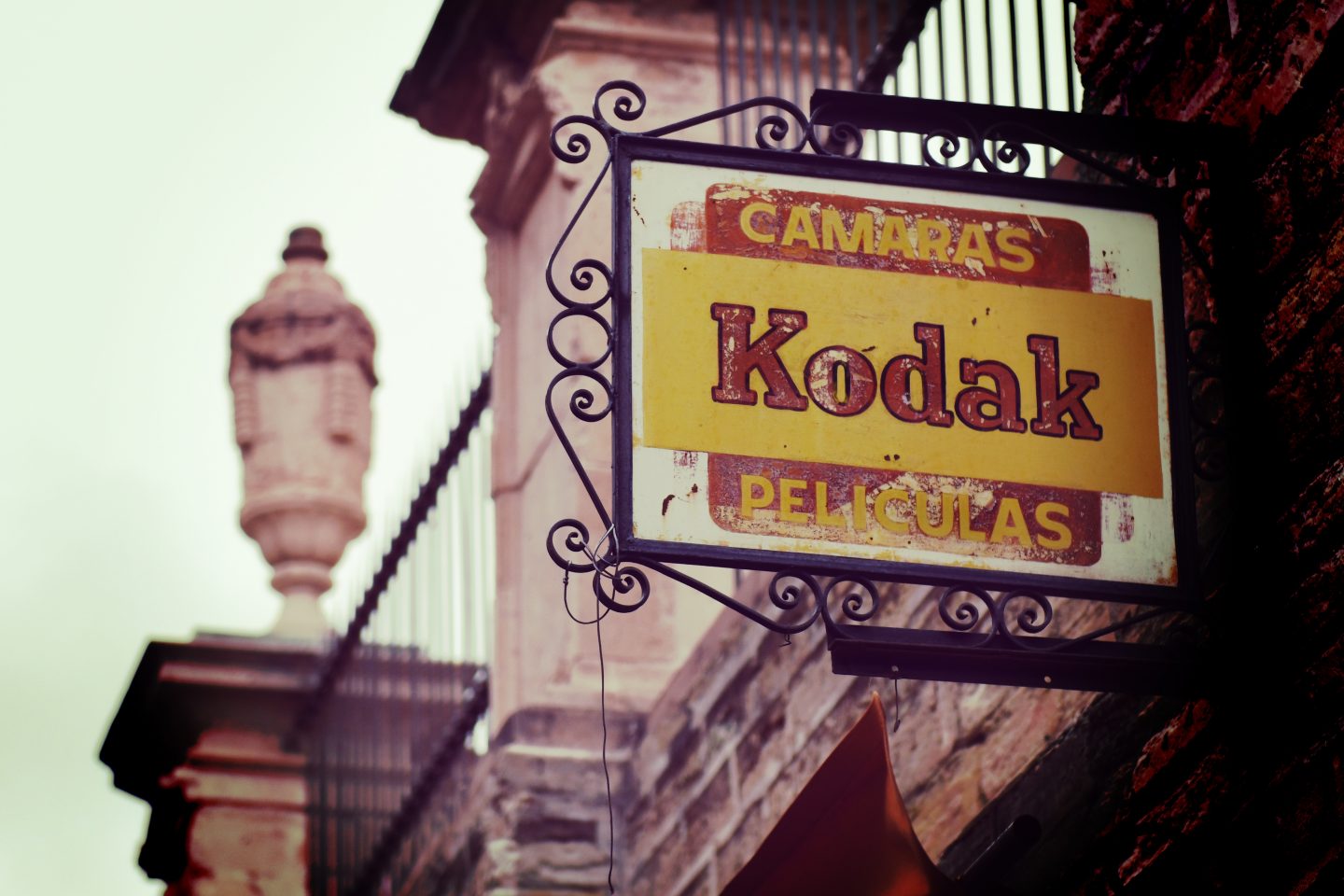Today’s church tomorrow: Going the way of Kodak?
This is the final article in the Urban Shalom series focusing on what it means to be a missional church community in a local urban neighbourhood.
Ronald JJ Wong // February 20, 2019, 11:06 am

Photo by Tim Mossholder on Unsplash
Generations grew up referring to “Kodak moments” as photo moments to capture on film.
Today, many young people do not know Kodak. In 2012, the company filed for bankruptcy. Kodak was disrupted. Kodak lost its purpose. It did not see the changes happening all around which fundamentally changed what it meant to capture moments: People were shifting from film to digital photography.
I fear many churches in Singapore will go down the same path as Kodak.
Evolution is necessary. Not that we fear the death of the Church, for that wouldn’t happen because God will not permit it. But we can fear becoming a Church that has forgotten her first love and her first works, and become lukewarm and be spat out of Jesus’ mouth (Revelation 3:16).
Missing the point?
The problem is that the way we are doing Church could actually be antithetical to her mission.
What is God’s mission for the Church? Paul’s epistle to the Ephesians concisely and comprehensively sets out the Christian good news and its implications.
God’s plan for the fullness of time is to unite all things in Christ.
Its first chapter sets out a clear and simple understanding of the mission of God. Paul first declares the ultimate purpose of God, which is to bless His people richly “in Christ”. The constant refrain of being “in Christ” (Ephesians 1:1-10) culminates in the declaration that God’s plan for the fullness of time is to unite all things in Christ.
The mission of God, then, given as the mission of the Church, is to unite all things to Christ the King. It is only by union “in Christ”, made possible through Christ’s blood shed on the Cross, are we blessed and become the Church that is the “fullness of [Christ] who fills all in all” (Ephesians 1:23).
More than meets the eye
This is a wider vision of the Church’s mission than what many of us are doing or thinking currently.
Often, when we think of missions, we think of the Great Commission in Matthew 28:19-20. To fulfil the Great Commission, we have to do the mission Jesus Himself embarked on: Proclaim the gospel of the Kingdom of God (not a gospel of being saved to heaven), teach the ethics of the Kingdom, and demonstrate the Kingdom of God through holistic healing (Matthew 4:23, 9:35).
Such holistic healing includes:
- spiritual healing – forgiveness of sin and casting out demonic strongholds
- relational healing – uniting marginalised people into community and uniting conflicting tribes
- physical healing
- ecological healing (Matthew 4:23, 9:35).
The Great Commission Jesus gave His disciples to teach people to obey everything He commanded necessarily refers back to this mission: proclaim, teach and heal.
To unite all things to Christ, we do good works that reflect the character of Christ.
In uniting all things to Christ, we reveal the character of Christ. To unite all things to Christ, we do good works that reflect the character of Christ, prepared for us beforehand to do (Ephesians 2:10) – works of justice and mercy, of healing and reconciliation.
We preach the unsearchable riches of Christ, bringing to light the mystery of God’s sovereign plan set long before (Ephesians 3:9).
And we live our lives reflecting the character of Christ, in a manner worthy of our calling (Ephesians 4:1).
This is not just about private morality (Ephesians 4:17-24), but living out our faith and mission in our communities (Ephesians 4:25-32, 5:1-21), in our churches (Ephesians 4:1-16), our marriages (Ephesians 5:22-32), our parent-children relationships (Ephesians 6:1-4) and in our work (Ephesians 6:5-9).
We do all this as an outworking of the gospel and as the pursuit of God’s mission for us, whether we are in Jerusalem or Singapore, in Asia or the Middle East, all to the ends of the earth.
The credibility issue
In our modern urban setting, we have no credibility and no opportunity to talk about Jesus’ cross and resurrection if we do not do the holistic mission of Jesus, the good works of holistic healing, and if we do not live out the character of Christ in our neighbourhoods and workplaces.
We would be hypocrites. Sadly, many non-Christians perceive us as such.
When we do all that wrong, we run contrary to God’s mission for the Church.
Our work is to believe; to have faith; to take risks.
Our work is to believe; to have faith; to take risks. No one has ever experienced faith without taking risks. The greater the risk you take, the more faith you have to exercise, the bigger your vision of God when He comes through.
But that’s not true for most of us. Most of us are safe and comfortable. In the Bible, when the people of God became safe and comfortable, they lost the plot.
The only time when we can ever be safe and comfortable is when Christ returns and brings all things to completion.
If we continue down this safe and comfortable path, we are just paving the way to our extinction. No more Kodak moments. Just bankruptcy – spiritual, moral and existential.
Elements of change
What needs to change?
- We need to change the culture of the Church to be about exercising bold faith. You can pray all you want, but without exercising faith, you are just a dud. Imagine the church of Antioch in Acts 13 praying and praying, and when they hear from the Spirit that they need to send Paul and Barnabas, they say: “I think better not, it’s very dangerous.” “No lah, they should stay and help grow our church numbers.”
- We need to change the structure of Church. The typical modern Singapore church has assumed a certain organisational corporate business model. The Church is Singapore, Inc. A typical Singapore local church is at once: (i) an educational centre; (ii) a social club; and (iii) a business offering various services (some offer merchandise as well) to non-members. Well, there is nothing inherently wrong with all that. But is this corporate business model serving the mission of the Church?
- We need to change how we lead in the Church. I can tell you what I observe about myself. I will follow a leader who has engaged with me before he asks me to do anything, who genuinely listens to my views – someone who is clear about the mission of God for the Church and who empowers me to take risks and try Kingdom ventures, and walks with me when I fail.
So we come back to the story of disruption and existence: If the Singapore Church does not disrupt itself, she will be disrupted and bankrupted.
There is hope yet. We must disrupt ourselves for the mission of God.
There is hope yet. We are in a season of transition – a season of leadership succession. Even the nation’s leadership is preparing for transition.
We must disrupt ourselves for the mission of God. Of course, the gates of hell will not prevail against the Church. But will the Singapore Church fail to fulfil her mission?
When we stand before God, when we account for all that we have done, when we present the glory of the nation which the kings of Singapore bring into the heavenly city, will we receive the blessing of God: “Well done, good and faithful servants”?
Our choice.
This article has been edited for length. You may access the full story here.
We are an independent, non-profit organisation that relies on the generosity of our readers, such as yourself, to continue serving the kingdom. Every dollar donated goes directly back into our editorial coverage.
Would you consider partnering with us in our kingdom work by supporting us financially, either as a one-off donation, or a recurring pledge?
Support Salt&Light



